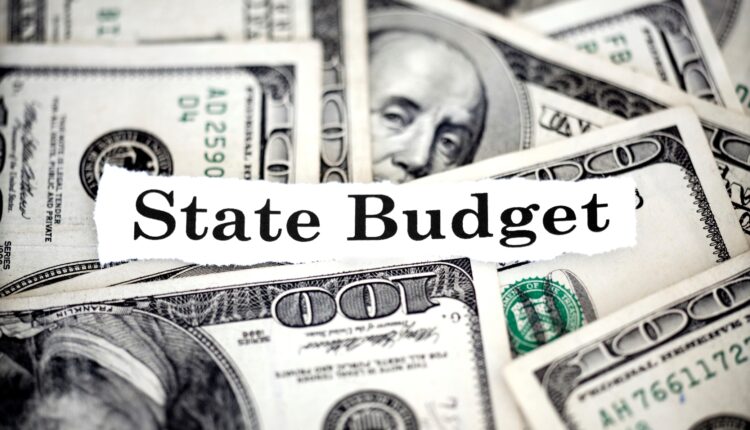With campaigns looming, Republicans are hoping to hammer out a budget deal quickly
Republican lawmakers and Gov. Katie Hobbs have begun negotiations on the state’s budget, but a deficit and partisan infighting could complicate plans to have it done by next month like GOP leaders are hoping.
Arizona’s budget is currently facing an estimated $1.7 billion deficit, due in part to a drop in tax collections. Chief among the drivers of the sagging revenue are individual income tax collections, which were far less than expected following the state’s implementation of a flat tax rate in 2023. And the expansion of the universal Empowerment Scholarship Account school voucher program has cost more than expected, and continues to exceed budget estimates.
The current year’s budget estimates the private school voucher program’s cost at $625 million with a total enrollment of 68,380 students, but revised estimates place this year’s cost at around $723.5 million with an enrollment of more than 74,000.
“I can confirm that budget conversations have started, but will decline to comment on details or timeline for the negotiations,” Christian Slater, the spokesman for Hobbs, said in an email to the Arizona Mirror.
Republican legislative leaders this week expressed optimism about the negotiations, saying in a press release that they are anticipating finalizing a budget by the end of April. Last year, the state passed its budget in May, after weeks of negotiations between Republicans and Hobbs focusing on how to spend the roughly $2.5 billion surplus. A key strategy to getting a deal done last year was to divvy up the surplus among lawmakers and allow them to allocate the money to one-time projects.
But with the state operating at a deficit this year, many of the expenditures made in last year’s budget could wind up on the chopping block as lawmakers and the executive branch try to balance the state’s books.
Earlier this year, Hobbs released her proposed $16 billion budget for the 2025 fiscal year that aimed to solve the deficit with a variety of proposals that Republicans said would be dead on arrival, especially calls to dramatically scale back the ESA voucher program.
The dynamics this year, with a deficit, are fundamentally different from last year, said GOP consultant Chuck Coughlin.
“They just hit what they thought was the easy button last time,” he told the Mirror. “That is not going to happen this time.”
But Prescott Senator Ken Bennett doesn’t anticipate any clawbacks on those projects included in last year’s budget to get “buy-in” from conservative lawmakers. He said that doing so would be “unfair” because it would “pick and choose” which projects will come to fruition.
“I think that, in retrospect, we probably shouldn’t have put all $2.5 billion in on-hand dollars on the table for everyone to divy up and spend,” Bennett said to the Mirror.
The bipartisan budget from last session was derided by some Democratic lawmakers who felt it didn’t do enough for Democratic priorities. Some also decried the use of one-time monies for “pet projects.” Hobbs’ proposed budget for this year clawed back some of those projects, but Bennett said he believes that won’t ultimately happen.
“I don’t think we will see so much clawbacking as much as delaying into the next fiscal year,” Bennett said, adding that it will be more about “cash flow management” than cuts.
Bennett, who was Senate president from 2003 to 2007, has seen his fair share of tough budget talks as the state dealt with a divided government and economic uncertainty. The first budget he helped negotiate meant striking a deal with Democratic Gov. Janet Napolitano to cut $120 million, which Bennett said was “no small task.”
“Any agreements on tough budget situations is not a function of time, it is a function of cooperation,” Bennett said, adding that he believes that even a “tough budget” can be negotiated fairly and fairly quickly.
Coughlin is not as optimistic.
“Republicans are known for cutting things, so I’m sure they will come to the table with cuts,” Coughlin said, adding that those cuts will likely be to state agencies or fall within the governor’s policy priorities and will likely create further tension. “They’ll come with cuts and she’ll come with clawbacks. Let the negotiations begin.”
Coughlin also pointed to the Republican legislature’s partisan makeup, in particular the far-right Arizona Freedom Caucus, whose members could act as a thorn in the side of negotiations or even approval of the budget.
“That creates substantial problems, not just for (Hobbs) but for (House Speaker Ben Toma), because Toma’s got to manage his caucus,” Coughlin said.
The Arizona Freedom Caucus has at times butted heads with Republican leadership. Last session, during a contentious late night vote on the state budget, Toma and Freedom Caucus leader Sen. Jake Hoffman, R-Queen Creek, butted heads.
Coughlin also said he does not believe that the projections by Republican leadership of finalizing a budget this month will likely come to fruition.
“They’re thinking they’re going to go in and propose a Republican budget and she is just going to have to swallow that, and I don’t think she is,” he said.
However, Coughlin said he doesn’t anticipate any “big policy wins” for Hobbs, as he anticipates she is waiting to see what will change in the legislature come November of this year. In both chambers, Republicans only hold a one-seat majority.
“The dice are going to get rolled in ‘24, and you’re going to get a whole new cast of characters,” Coughlin said. “If I’m Hobbs, I just try to get through this year.”
Requests for comment to both Democratic and Republican leadership in the House and Senate went unreturned.



Comments are closed.